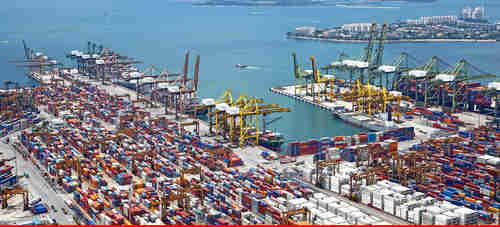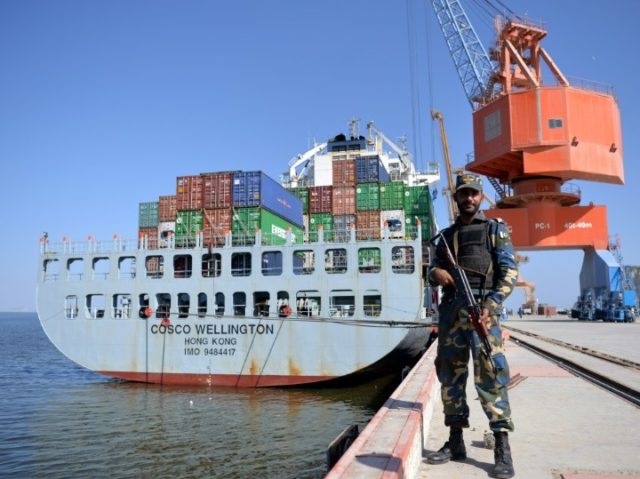This morning’s key headlines from GenerationalDynamics.com
- US-Pakistan relations continue as before, despite US aid cutoff
- US requests Pakistan’s permission to ship Afghan supplies through Gwadar seaport
US-Pakistan relations continue as before, despite US aid cutoff

China-built Gwadar port in Pakistan
It was less than two weeks ago when president Donald Trump made a scathing criticism of Pakistan’s “lies and deceit” related to the Afghanistan war, and said that $2 billion in security aid to Pakistan would be suspended. It was widely feared that this announcement would cause US-Pakistan relations to spiral into open hostility and a complete break. ( “3-Jan-18 World View — US-Pakistan relations hit major crossroad, as US cuts aid”)
Well, apparently nothing has really changed. Even the inevitable angry words have not been particularly harsh. Yes, some feelings were crushed, and Pakistan’s Army Chief General Qamar Javed Bajwa said that “the entire Pakistani nation felt betrayed.” However, nothing worse than that has happened. In fact, since Trump’s announcement, there have been two phone calls between Bajwa and US CENTCOM military commander General Joseph Votel.
This was summarized in a tweet from Pakistan’s military:
Comd USCENTCOM & a US Senator telephoned COAS to discuss security coop post POTUS tweet. “Entire Pakistani nation felt betrayed on trivialising our decade old cooperation. We won’t ask for restoration of financial assistance but honourable recognition of our contributions”, COAS. ‘pic.twitter.com/oHEQGGvyIf’
According to an unnamed senior Pakistani foreign ministry official:
There is no freeze [in relations]. We are speaking to each other, at all levels. We are not sharing the details of that at this time, but the effort to find some common ground or traction on both sides is there.
This sentiment was confirmed by a US State Department official, also unnamed.
Richard Snelsire, the spokesperson for the US embassy in Islamabad, said: “We have received no notification regarding a suspension in defense and intelligence cooperation.”
In fact, a few harsh words from Trump are not the worst thing that has happened to US-Pakistan relations. In 2011, the US conducted a military operation on Pakistani soil to capture Osama bin Laden, and that REALLY infuriated the Pakistanis. Later, a US air strike inside Pakistan killed more than a dozen army soldiers and officers. In reaction, Pakistan closed down the supply lines to the US forces in Afghanistan and only reopened them after the US apologized.
So US-Pakistan relations weathered those crises, and have apparently weathered the current crisis, and things are going on as before. Reuters and Al Jazeera and Dawn (Pakistan)
Related Articles
- US-Pakistan relations hit major crossroad, as US cuts aid (03-Jan-2018)
- Trump promises victory in Afghanistan by redefining ‘victory’ (23-Aug-2017)
U.S. requests Pakistan’s permission to ship Afghan supplies through Gwadar seaport
Because Afghanistan is a land-locked country, the US-led NATO coalition in Afghanistan receives supplies that arrive in Pakistan’s port in Karachi. The supplies then take a full week to travel overland by truck to reach Afghanistan. When Pakistan shut down this supply route in 2011, supplies had to take a very long route through Central Asia.
So now the NATO coalition forces are asking Pakistan to permit supplies to arrive in Pakistan’s China-built Gwadar port. From there they would be loaded onto trucks and reach Afghanistan within 24 hours, rather than a week.
And this brings to mind one of the great issues that the pundits discussed after Trump announced the cutoff of aid to Pakistan: That cutting ties with Pakistan would push Pakistan further into the arms of China.
It is true China and Pakistan describe their relationship as “all-weather friends, deeper than the deepest ocean, sweeter than honey and dearer than eyesight” and all that. However, there is a whole nother side to that issue that has not been mentioned much: Pakistan does not want to be China’s bitch.
Particularly in the last one or two years, China has been harshly rolling over Pakistan, with issues related to the $60-billion China-Pakistan Economic Corridor (CPEC). China is demanding full control of infrastructure such as dams and power plants. China will control thousands of acres of Pakistani land to gain access for Pakistan’s agriculture to meet China’s food needs. Thousands or tens of thousands of Chinese workers are already flooding into Pakistani cities and towns, creating “Chinatowns” across the country. Mandarin Chinese is already a required school subject in Sindh province. The Pakistani culture will be transformed in many places to a Chinese culture. China will install an elaborate electronic surveillance system in Pakistani cities, for use with policing, similar to the harsh electronic surveillance systems being installed in China itself.
The worst may be that China is setting a debt trap for Pakistan, similar to what it has already done in other countries, such as Tajikistan and Sri Lanka. Pakistan will be $90 billion in debt to China, and will have to repay China over 30 years. If Pakistan fails to repay it, then China will take over territory and other Pakistani assets. So Pakistan’s relation with China may be “dearer than eyesight,” but that does not mean that Pakistan wants to be a full-fledged colony of China, just as it once was, along with India, a full-fledged colony of Britain.
There is also an emerging controversy over the port at Gwadar. China insists that the purpose of CPEC is purely commercial: to provide a way for goods to travel from China’s Xinjiang province to the Indian Ocean, and Gwadar port is the endpoint. But in the last month, speculation has been growing that China plans to turn Gwadar into a Chinese military naval base. The speculation has emerged over the question of how China is going to provide security in the Gwadar port.
Both China and Pakistan are denying the speculation. An unnamed Pakistani official is quoted as saying, “Pakistan Navy is well-equipped to handle the security of Chinese shipments, and we will manage the security of the shipments effectively.”
Unfortunately, such assurances by China are completely laughable, since China has pretty much zero credibility about anything. When China began building illegal artificial islands in the South China Sea, they insisted that they were purely for commercial use, and would be popular tourist attractions. That was simply a lie. Today, those islands are full-fledged military bases, bristling with Chinese missiles, warplanes, radars, bunkers, and other military equipment. No tourists are welcome.
So now NATO is asking Pakistan to allow its military supplies for Afghanistan to transit through Gwadar port, and Pakistan is said to be considering the question. Presumably, one of the issues that Pakistani officials are considering is this: Gwadar is supposed to be a commercial port, so let’s make some money from it by allowing NATO shipments, and then use that money to pay off the humongous debt we owe to China. Whether China will be happy with that solution remains to be seen.
Generational Dynamics predicts that in the approaching Clash of Civilizations world war, the “axis” of China, Pakistan and the Sunni Muslim countries will be pitted against the “allies,” the US, India, Russia. Iran and the West. Asia Times and Jamestown and VOA and Daily Pakistan and Value Walk and The Hindu
Related Articles
- Pakistan overwhelmed and China alarmed over the China-Pakistan Economic Corridor (CPEC) (12-Dec-2017)
- Massive China-Pakistan CPEC energy project said to end energy crisis ‘soon’ (23-Mar-2017)
- China takes control of strategic Hambantota seaport in Sri Lanka, raising concerns in India (11-Dec-2017)
- Massive China-Pakistan CPEC energy project said to end energy crisis ‘soon’ (23-Mar-2017)
KEYS: Generational Dynamics, Pakistan, Qamar Javed Bajwa, Joseph Votel, Afghanistan, Richard Snelsire, Karachi, Gwadar, China, Xinjiang, South China Sea, China-Pakistan Economic Corridor, CPEC, Tajikistan, Sri Lanka
Permanent web link to this article
Receive daily World View columns by e-mail

COMMENTS
Please let us know if you're having issues with commenting.